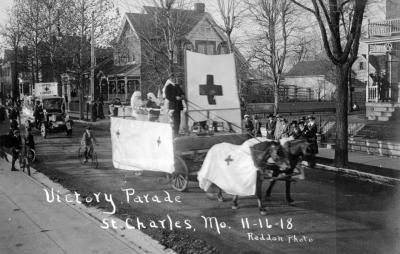Grant awarded to MU researchers looks for similarities, differences between 1918 flu pandemic and COVID-19 pandemic

Credit: Image courtesy of The State Historical Society of Missouri.
What can the 1918 flu pandemic teach people about the current COVID-19 pandemic? That’s what a group of researchers at the University of Missouri hope to uncover with the help of a recent COVID-19 RAPID grant from the National Science Foundation.
Over the course of a year, the grant allows researchers to study the 1918 flu pandemic in Missouri for any similarities and differences to the current COVID-19 pandemic. Their findings could help inform overall strategies for mitigating the spread of the current virus in the U.S.
Researchers from Mizzou’s Christopher S. Bond Life Sciences Center, College of Arts and Science, College of Engineering, College of Veterinary Medicine, School of Health Professions and School of Medicine are involved in the project. Lisa Sattenspiel, a professor and chair of the Department of Anthropology in the College of Arts and Science, and Carolyn Orbann, an associate teaching professor of health science in the School of Health Professions, are the co-principal investigators on the project.
Sattenspiel is a biological anthropologist who has studied human infectious diseases for more than 40 years, including more than 25 years studying the 1918 flu pandemic. She said the team’s interdisciplinary approach is important for developing a complete understanding of an infectious disease and how it spreads among human populations.
“Any kind of infectious disease in humans is a really complex problem,” Sattenspiel said. “If you want to fully understand a disease’s impact, you not only have to understand the biology and epidemiology of the disease, but you also have to understand the social circumstances — how people are interacting, spreading and responding to the disease and why people are doing what they do. That’s what we will be able to do here with all of the various disciplines involved with this project.”
The project will use Missouri death certificate data between 1918-1920 from people who died from influenza and pneumonia, since it was difficult at the time to distinguish which respiratory disease was the actual cause of death. The data will be used by the team to develop a detailed analysis of the 1918 pandemic, including geographical spread, underlying socioeconomic conditions and any differences between rural and urban areas in the state. The researchers said their analysis will also include racial and ethnic disparities but will be limited because of the amount of information that is available from that time.
Orbann said by studying a three-year period and not just 1918, the project could also provide valuable information about the potential for additional outbreaks — called an echo wave — beyond the first geographical spread of the disease.
“Existing research on the 1918 pandemic has shown that some places around the world experienced what looks like an echo wave all the way to 1920,” Orbann said. “For instance, some places in Missouri reported more deaths in late 1919 and early 1920 than during the peak in 1918. That information could help us better understand if places that escape the first wave of coronavirus — where we are now — could have the potential to get hit hard with the virus later on.”
###
Media Contact
Eric Stann
[email protected]
Original Source
https:/




